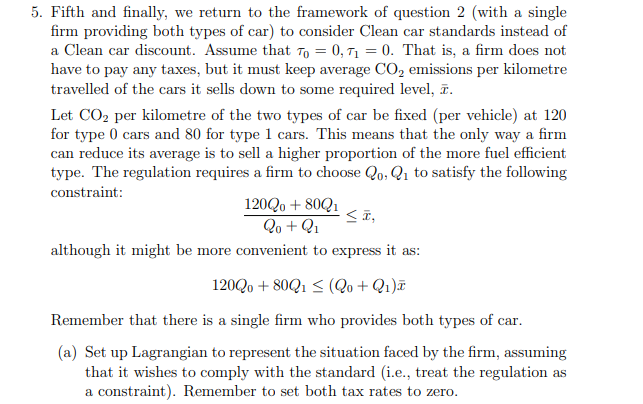Managerial Economics: Applications, Strategies and Tactics (MindTap Course List)
14th Edition
ISBN:9781305506381
Author:James R. McGuigan, R. Charles Moyer, Frederick H.deB. Harris
Publisher:James R. McGuigan, R. Charles Moyer, Frederick H.deB. Harris
Chapter8: Cost Analysis
Section: Chapter Questions
Problem 2.2CE
Related questions
Question
Just wanting answer to question 5 a, Thank you :)

Transcribed Image Text:5. Fifth and finally, we return to the framework of question 2 (with a single
firm providing both types of car) to consider Clean car standards instead of
a Clean car discount. Assume that To = 0, T1 = 0. That is, a firm does not
have to pay any taxes, but it must keep average CO, emissions per kilometre
travelled of the cars it sells down to some required level, ĩ.
Let CO2 per kilometre of the two types of car be fixed (per vehicle) at 120
for type 0 cars and 80 for type 1 cars. This means that the only way a firm
can reduce its average is to sell a higher proportion of the more fuel efficient
type. The regulation requires a firm to choose Qo, Q1 to satisfy the following
constraint:
120Q0 + 80Q1
Qo + Q1
although it might be more convenient to express it as:
120Qo + 80Q1 < (Qo + Q1)¤
Remember that there is a single firm who provides both types of car.
(a) Set up Lagrangian to represent the situation faced by the firm, assuming
that it wishes to comply with the standard (i.e., treat the regulation as
a constraint). Remember to set both tax rates to zero.

Transcribed Image Text:There are two types of car, distinguished by how fuel eficient they are. Type
O is the less fuel efficient type, and type 1 is the more fuel efficient. The inverse
demand curves for the two types of car are:
Po = 250 – Qo – Qı/2, P = 120 – Q1 – Qo/2.
(1)
Cost functions are
Co(Qo) = 50Q0, C:(Q1) = 20Q1
(2)
Expert Solution
This question has been solved!
Explore an expertly crafted, step-by-step solution for a thorough understanding of key concepts.
Step by step
Solved in 3 steps with 15 images

Knowledge Booster
Learn more about
Need a deep-dive on the concept behind this application? Look no further. Learn more about this topic, economics and related others by exploring similar questions and additional content below.Recommended textbooks for you

Managerial Economics: Applications, Strategies an…
Economics
ISBN:
9781305506381
Author:
James R. McGuigan, R. Charles Moyer, Frederick H.deB. Harris
Publisher:
Cengage Learning


Managerial Economics: A Problem Solving Approach
Economics
ISBN:
9781337106665
Author:
Luke M. Froeb, Brian T. McCann, Michael R. Ward, Mike Shor
Publisher:
Cengage Learning

Managerial Economics: Applications, Strategies an…
Economics
ISBN:
9781305506381
Author:
James R. McGuigan, R. Charles Moyer, Frederick H.deB. Harris
Publisher:
Cengage Learning


Managerial Economics: A Problem Solving Approach
Economics
ISBN:
9781337106665
Author:
Luke M. Froeb, Brian T. McCann, Michael R. Ward, Mike Shor
Publisher:
Cengage Learning